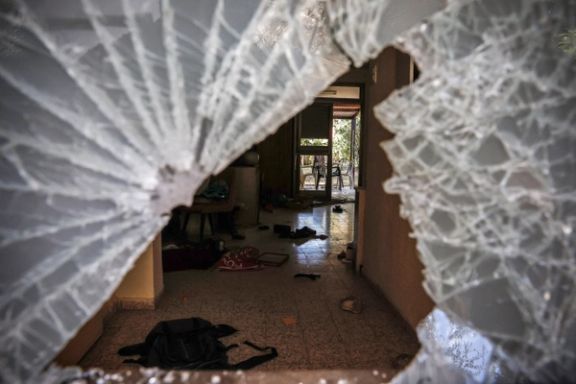Families of American victims from October 7 seek to hold Iran accountable

Iris Haggai, who lost both her parents on October 7, is one of several families of American victims, who have sued Iran, equipped with newly – unsealed documents revealing Tehran’s alleged fingerprints on the atrocities.
The victims' families filed the lawsuit against Iran in the US District Court in Washington on November 17. Forty-six Americans were among the more than 1,200 killed during the attack and 12 American citizens were among the more than 250 hostages kidnapped to Gaza.
The suit, which has been reviewed by Iran International, is based on the evidence presented by attorneys for the plaintiffs in what they refer to as secret documents uncovered by lawyer Gary Osen.
“The October 7 Attack, led by Hamas and joined by PIJ, the PFLP and others, was part of a fully coordinated plan, financed and managed by Iran through the IRGC QF, to annihilate Israel by attacking it from multiple fronts simultaneously,” the lawsuit reads.
Documents include a list of payments made by Iran to Hamas leaders over the years and discussions of mutual defense agreement between Palestinian groups, Iran, and its proxies.
The complaint also includes a decision to request the Islamic Republic send Hamas $7 million monthly for mobilization of a planned confrontation.
The lawsuit also alleges that Iran and its proxies planned what they called a big deception before Yahya Sinwar’s “Big Project” with Iran’s Axis of Resistance.
“It appears that Hamas, Hezbollah, and the IRGC pulled off a 'double bluff' in planning the October 7 operation—deceiving Israel by openly stating their intentions in a way that convinced Israel that they were saber-rattling rather than carrying out a concrete plan of attack,” the lawsuit claims.
Ruby Chen's son Itay, 19, was understood to have been held hostage until it was confirmed this year that the young soldier was killed on October 7 and his body taken to Gaza.
For the bereft father, the lawsuit is at least a step to help prevent other families suffering the same tragedy and the chance to broaden a crackdown on terror funding.
"Iran funds a global terrorism financing network which Hamas benefits from. Money to support terrorism raised worldwide is currently 'parking' in various 'charity organizations' in countries such as Turkey, Kuwait, Indonesia and others," he told Iran International.
"The court case is to prevent those funds from being used for future terrorist attacks and deter other countries from funding terrorism."
While the concept of justice seems elusive to the families of the 101 hostages in Gaza, around half believed to be dead, their loved ones' return the only possible compensation, he said there is a bigger mission.
"We would like to see the expansion of the list of terrorist countries to organizations such as financial institutions or charity funds that enable the global terrorist financial network to be blacklisted and enable US victims to sue them as well and be accountable for the money transferred to Hamas and enabled the vicious October 7 attacks," he added.
For Iris, this is about holding Iran accountable and to send a message.
“It’s about making sure we understand the role that the IRGC is playing in all of this. It’s about the October 7th attack that was led by Hamas, but it was also led by the Islamic regime in Iran, who makes sure that Hamas has their weapons, make sure that they operate the same way that the Islamic regime in Iran wants them to operate,” Iris told Iran International.
She lost not only her parents, but 117 people that she knew growing up in Kibbutz Nir Oz were suddenly dead, missing or kidnapped in just one day. Judi Weinstein Haggai and Gadi Haggai, like much of Kibbutz Nir Oz, were pro-peace activists who abhorred war, said their daughter Iris.
On October 7, their morning routine walk in their Kibbutz turned into tragedy.
Judi witnessed her husband being killed. She called medical emergency services, describing in detail what had happened over the phone. Iris said she listened to the recordings. Judi had also been shot by Hamas, and it is not known if she died of her wounds or if she was killed after. Both their bodies are being held hostage in Gaza,
“It's not just about my parents. It's about the whole community. 117 people disappeared from my life in one day,” said Iris.
Iris said the lawsuit has evidence of Iran’s role in October 7 and that she is hoping this will help put the spotlight on that to dissuade Iran from using its proxies as a cover.
The lawsuit could have an indirect or direct impact on the Islamic Republic establishment, Gissou Nia, an international human rights lawyer told Iran International.
Nia, who helped lead the successful campaign to remove the Islamic Republic of Iran from the UN Commission on the Status of Women, said most of the Islamic Republic’s direct assets were seized and have already been paid out.
But she said the impact can sometimes be direct, like in the case of US authorities seizing Iranian flag tankers in open waters. The proceeds from that liquidated tankers go into a fund for US Victims Fund of State sponsored terror.
“But if people evade sanctions, if companies, for example, BNP Paribas, a bank that was doing banking with Islamic Republic of Iran officials and other affiliated entities, if they had to pay a certain penalty to the U.S. government because they were found in violation of that, that's the kind of money that would go into a fund.”
Foreign governments are generally considered beyond the jurisdiction of US courts, but the terrorism exception to the Foreign Sovereign Immunities Act (FSIA) allows the courts to hold these countries accountable, where immunity is not absolute.